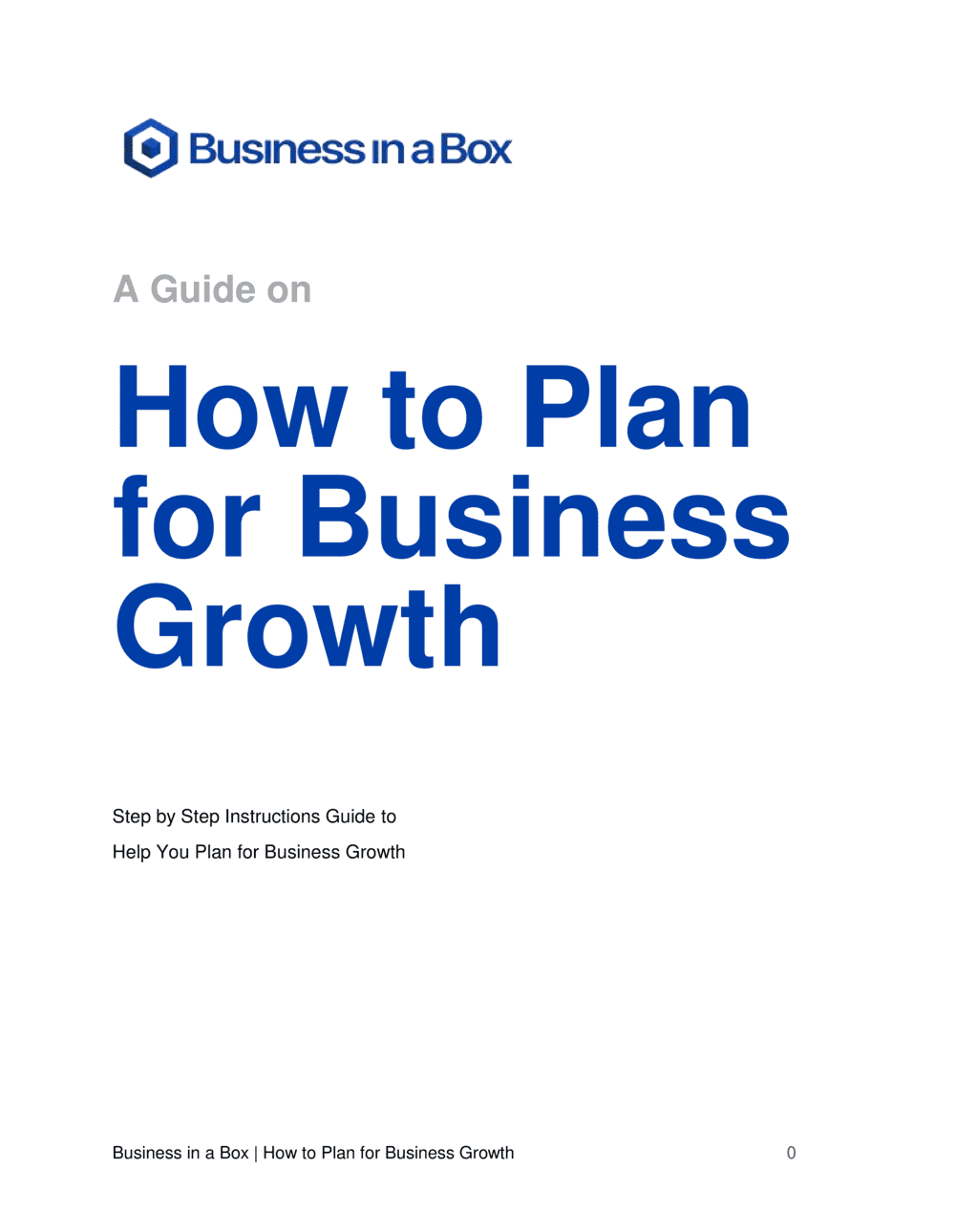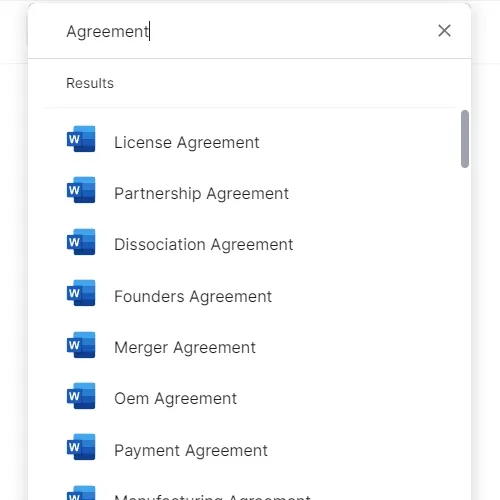How To Plan For Business Growth

Document content
This how to plan for business growth template has 15 pages and is a MS Word file type listed under our sales & marketing documents.
Sample of our how to plan for business growth template:
A Guide on How to Plan for Business Growth Step by Step Instructions Guide to Help You Plan for Business Growth Table of Contents How to Plan for Business Growth 2 Understanding the Need for Planning for Business Growth 2 What is Planning for Business Growth? 2 Strategies to Help You Plan for Business Growth 4 Does Your Company Need to Plan for a Business Growth Strategy? 5 How to Draft a Plan for Business Growth 8 Important Planning Strategies 10 Why Choose Business-in-a-Box 13 Helpful Documents for Planning Business Growth 14 How to Plan for Business Growth Understanding the Need to Plan Business Growth Growing your business is something that every business owner dreams about. After all, business growth would ensure a stream of steady profits, revenues, customers, and improved reputation. However, business growth is not as simple as it looks. A lot of planning goes into the simplest business growth strategy: opening a new branch or introducing a new product line. Planning for business growth is essential to ensure that all the desired business growth objectives are met successfully with fewer setbacks during the process. Planning for business growth will also allow you to measure and evaluate the success of your business growth plans and identify any areas for improvement. It will also allow you to visualize your future. What is Planning for Business Growth? Planning is indeed vital for successful business growth. Most of us view planning and business growth as two separate facets, but this should never be the case, since planning and business growth go hand in hand. One cannot succeed without the other. Planning for business growth is not just about planning for the future. It involves setting out a detailed plan for business growth that covers your preferred growth strategies, how you intend to achieve them, financing plans for growth, and, of course, a plan B in case things don't work out as expected. Apart from this, the operational and tactical aspects of business growth will also need to be planned, such as workforce planning, sales and production budgets, working capital requirements and so on. Planning for business growth is a vast concept, and most large companies allocate this task to specific departments. Planning for business growth is crucial for any business's sustained growth and success, big or small; therefore, never underestimate the need to plan. Strategies to Help You Plan for Business Growth Now that we have established the importance of planning for business growth, we need to understand the different options available in order to choose the best one that meets the purpose and objectives of your organization. Here are a few of the common robust strategies for planning for business growth: 1. Brainstorming Sessions Encourage staff across different levels and departments to come together and engage in brainstorming sessions. This will ensure a fresh exchange of ideas on possible business growth strategies and the feasibility of each plan. It will also be an excellent motivational team-building exercise to help the staff collaborate and pursue relevant business growth strategies. 2. Focus Groups and Seeking the Opinion of Experts Planning requires careful evaluation of each growth strategy and its expected outcome. It also requires the same strategy to be analyzed from different angles and perspectives. This is why it is important to hold focus groups and seek the opinions of experts. They will ensure that all selected growth strategies are well planned for any possible setbacks and practical solutions. 3. Business Forecasts and Plans Simply having it all in your head is not sufficient. It will help if you put down your ideas and thoughts into a formal business plan and forecasts. These business plans will vary and include plans like finance plans and cashflow forecasts, profit forecasts, investment plans, workforce plans, and business expansion plans. Whatever your plans may be, document it properly and maintain a formal business plan as part of your planning for business growth strategy. 4. Flowcharts and Decision Trees The use of flowcharts is a great way to document the flow of a process from beginning to end. It is easy to comprehend, and any loose ends can be easily identified. It works best for growth strategies such as expansion plans in a different country or market, since this would require tasks to move in a set flow. Decision trees are great for business growth strategies that have many alternatives and outcomes. Using decision trees, you can identify the best strategy and identify any weaknesses well. 5. Progress Meetings Holding regular progress meetings will help ensure all staff are well aware of their duties and contribution to business growth plans. This will help smooth out any confusion and potential problems. These progress meetings will also help keep tabs on whether you are on the right track as expected or falling behind schedule-any variances between planned versus actual results will be the focal point at these meetings. Does Your Company Need to Plan for a Business Growth Strategy? Business growth is not something that takes place on its own. It requires a lot of thought, calculated decisions, and a certain degree of risk-taking ability. Most of us are under the misconception that small and medium-sized businesses and owner-managed businesses do not need to have a formal plan for business growth strategies. But, this thinking is wrong. All companies, whether big or small, public or private, owner-managed or not, need to invest time, effort, and finances to plan for business growth strategies. Planning will ensure a smooth progression of your business plans, and also, in case things don't turn out well, it will open up different avenues with different outcomes that may be better than expected. Planning will help you see the road ahead and plan for any setbacks. It will promote a thoughtful and detail-oriented work plan and culture. Therefore, all businesses must plan for a successful business growth strategy. Deciding on a Business Growth Strategy Plan There are different plans for business growth strategies at different levels of your growth stage, including the pre-growth and post-growth stages. Each of these plans will target different key areas and serve different purposes, but the combination of these plans will birth a dynamic business growth strategy. Deciding on the various plans for business growth strategies is not as easy as it seems. But a good way to start will be to engage in discussion and consultation with your staff and other relevant stakeholders who will be playing a significant role in your business growth strategies. Since these people, especially your employees, will be directly involved in the growth journey, they will have valuable ideas and insights into developing practically feasible and achievable business plans. They will also be able to develop out-of-the-box ideas that will give your business a distinct competitive edge. Before planning a growth strategy, evaluate all the dos and don'ts of each strategy and pick the one in line with your organizational goals and objectives. Keeping Your Company Philosophy in Mind Big or small, your company philosophy and culture are what drive most business decisions. Most if not all businesses have some values that they will never compromise on; hence, these need to be considered when planning for business growth. For instance, some businesses may not want to engage in businesses that cause societal harm like casinos and alcohol. It that is the case, it would be unwise and a poor fit to acquire a casino or bar as part of your business growth strategy. When planning for business growth, be well aware of your company philosophy and how the public views your company and its values
3,000+ Templates & Tools to Help You Start, Run & Grow Your Business

Document content
This how to plan for business growth template has 15 pages and is a MS Word file type listed under our sales & marketing documents.
Sample of our how to plan for business growth template:
A Guide on How to Plan for Business Growth Step by Step Instructions Guide to Help You Plan for Business Growth Table of Contents How to Plan for Business Growth 2 Understanding the Need for Planning for Business Growth 2 What is Planning for Business Growth? 2 Strategies to Help You Plan for Business Growth 4 Does Your Company Need to Plan for a Business Growth Strategy? 5 How to Draft a Plan for Business Growth 8 Important Planning Strategies 10 Why Choose Business-in-a-Box 13 Helpful Documents for Planning Business Growth 14 How to Plan for Business Growth Understanding the Need to Plan Business Growth Growing your business is something that every business owner dreams about. After all, business growth would ensure a stream of steady profits, revenues, customers, and improved reputation. However, business growth is not as simple as it looks. A lot of planning goes into the simplest business growth strategy: opening a new branch or introducing a new product line. Planning for business growth is essential to ensure that all the desired business growth objectives are met successfully with fewer setbacks during the process. Planning for business growth will also allow you to measure and evaluate the success of your business growth plans and identify any areas for improvement. It will also allow you to visualize your future. What is Planning for Business Growth? Planning is indeed vital for successful business growth. Most of us view planning and business growth as two separate facets, but this should never be the case, since planning and business growth go hand in hand. One cannot succeed without the other. Planning for business growth is not just about planning for the future. It involves setting out a detailed plan for business growth that covers your preferred growth strategies, how you intend to achieve them, financing plans for growth, and, of course, a plan B in case things don't work out as expected. Apart from this, the operational and tactical aspects of business growth will also need to be planned, such as workforce planning, sales and production budgets, working capital requirements and so on. Planning for business growth is a vast concept, and most large companies allocate this task to specific departments. Planning for business growth is crucial for any business's sustained growth and success, big or small; therefore, never underestimate the need to plan. Strategies to Help You Plan for Business Growth Now that we have established the importance of planning for business growth, we need to understand the different options available in order to choose the best one that meets the purpose and objectives of your organization. Here are a few of the common robust strategies for planning for business growth: 1. Brainstorming Sessions Encourage staff across different levels and departments to come together and engage in brainstorming sessions. This will ensure a fresh exchange of ideas on possible business growth strategies and the feasibility of each plan. It will also be an excellent motivational team-building exercise to help the staff collaborate and pursue relevant business growth strategies. 2. Focus Groups and Seeking the Opinion of Experts Planning requires careful evaluation of each growth strategy and its expected outcome. It also requires the same strategy to be analyzed from different angles and perspectives. This is why it is important to hold focus groups and seek the opinions of experts. They will ensure that all selected growth strategies are well planned for any possible setbacks and practical solutions. 3. Business Forecasts and Plans Simply having it all in your head is not sufficient. It will help if you put down your ideas and thoughts into a formal business plan and forecasts. These business plans will vary and include plans like finance plans and cashflow forecasts, profit forecasts, investment plans, workforce plans, and business expansion plans. Whatever your plans may be, document it properly and maintain a formal business plan as part of your planning for business growth strategy. 4. Flowcharts and Decision Trees The use of flowcharts is a great way to document the flow of a process from beginning to end. It is easy to comprehend, and any loose ends can be easily identified. It works best for growth strategies such as expansion plans in a different country or market, since this would require tasks to move in a set flow. Decision trees are great for business growth strategies that have many alternatives and outcomes. Using decision trees, you can identify the best strategy and identify any weaknesses well. 5. Progress Meetings Holding regular progress meetings will help ensure all staff are well aware of their duties and contribution to business growth plans. This will help smooth out any confusion and potential problems. These progress meetings will also help keep tabs on whether you are on the right track as expected or falling behind schedule-any variances between planned versus actual results will be the focal point at these meetings. Does Your Company Need to Plan for a Business Growth Strategy? Business growth is not something that takes place on its own. It requires a lot of thought, calculated decisions, and a certain degree of risk-taking ability. Most of us are under the misconception that small and medium-sized businesses and owner-managed businesses do not need to have a formal plan for business growth strategies. But, this thinking is wrong. All companies, whether big or small, public or private, owner-managed or not, need to invest time, effort, and finances to plan for business growth strategies. Planning will ensure a smooth progression of your business plans, and also, in case things don't turn out well, it will open up different avenues with different outcomes that may be better than expected. Planning will help you see the road ahead and plan for any setbacks. It will promote a thoughtful and detail-oriented work plan and culture. Therefore, all businesses must plan for a successful business growth strategy. Deciding on a Business Growth Strategy Plan There are different plans for business growth strategies at different levels of your growth stage, including the pre-growth and post-growth stages. Each of these plans will target different key areas and serve different purposes, but the combination of these plans will birth a dynamic business growth strategy. Deciding on the various plans for business growth strategies is not as easy as it seems. But a good way to start will be to engage in discussion and consultation with your staff and other relevant stakeholders who will be playing a significant role in your business growth strategies. Since these people, especially your employees, will be directly involved in the growth journey, they will have valuable ideas and insights into developing practically feasible and achievable business plans. They will also be able to develop out-of-the-box ideas that will give your business a distinct competitive edge. Before planning a growth strategy, evaluate all the dos and don'ts of each strategy and pick the one in line with your organizational goals and objectives. Keeping Your Company Philosophy in Mind Big or small, your company philosophy and culture are what drive most business decisions. Most if not all businesses have some values that they will never compromise on; hence, these need to be considered when planning for business growth. For instance, some businesses may not want to engage in businesses that cause societal harm like casinos and alcohol. It that is the case, it would be unwise and a poor fit to acquire a casino or bar as part of your business growth strategy. When planning for business growth, be well aware of your company philosophy and how the public views your company and its values
Easily Create Any Business Document You Need in Minutes.

Access over 3,000+ business and legal templates for any business task, project or initiative.

Customize your ready-made business document template and save it in the cloud.

Share your files and folders with your team. Create a space of seamless collaboration.
Templates and Tools to Manage Every Aspect of Your Business.
Business in a Box Covers Every Business Department
Includes 16 Types of Business Documents You Need
and Achieve Your Business Goals Faster.
